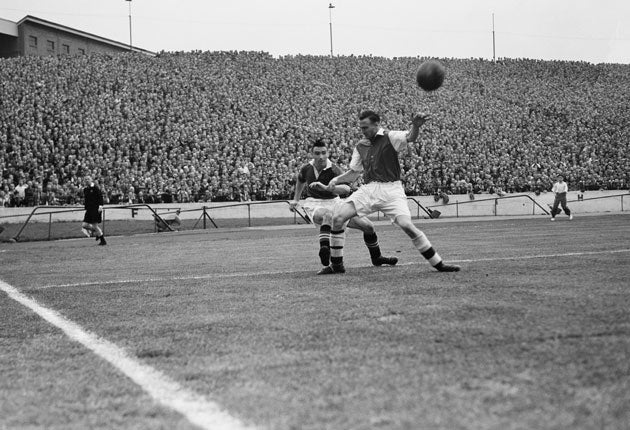Bobby Campbell: Chelsea and Scotland stalwart of the Forties and Fifties

Bobby Campbell belonged to the generation of great Scottish footballers who lit up pitches across Britain in the immediate post-war years. He starred as a winger most notably for Chelsea, and on five occasions for his country. He also played for Falkirk and Reading, and was the manager at Dumbarton, and then coach and manager at Bristol Rovers, where he gave 17 years of service.
Bad timing robbed Campbell of a place in the Chelsea side that won the club’s first ever league title in 1954-55.
Having played 213 games and scored 40 goals in a seven-year stay at Stamford Bridge from 1947, he was sold to Reading in August 1954. The team he left behind, under the management of the moderniser Ted Drake and the captaincy of Roy Bentley, promptly won the First Division.
Campbell was a quick, technically capable player whose versatility meant he could function on either flank or as an inside-forward. For preference he operated on the right, from where his crosses routinely provided goals for Bentley.
Campbell’s five caps for Scotland – two in May 1947 and three in the spring of 1950 – fail in themselves to tell the story of why he did not win more. Scotland was blessed in that era with an abundance of talent, especially in the forward areas and on the right. Those were the days of Hibernian’s “Famous Five” forward line: Gordon Smith, Bobby Johnstone, Lawrie Reilly, Eddie Turnbull and Willie Ormond. They all won multiple Scotland caps in the post-war years, with Smith being a direct rival to Campbell for a place in the national side.
Two others in competition for the same Scotland role were Willie Waddell of Rangers and Billy Liddell of Liverpool, both exceptional talents still considered as all-time greats.
Waddell was a Rangers prodigy and later the manager at Ibrox. Liddell remains Liverpool’s fourth-highest goal scorer of all time.
In that context, Campbell’s five caps were no small achievement. His sole Scotland goal came in a 3-1 win over Switzerland in April 1950 in front of a capacity crowd of 123,751 at Hampden Park in Glasgow. He later said of that strike: “It gave me the greatest thrill of my life”.
Campbell’s senior career began at Falkirk in 1941 although the war limited his competitive seasons there to one, 1946-47, when he scored six goals in 16 league appearances. During the war he did service in London – where he played wartime football for Queen’s Park Rangers – and in India, where he served and played alongside Tommy Walker, then a Heart of Midlothian forward, who would join Chelsea in 1946.
On Walker’s recommendation, Chelsea’s Scottish manager, Billy Birrell, bought Campbell in 1947, paying a substantial fee of £9,000. The investment was rewarded not just with Campbell’s goals but the assistance he gave Bentley: the latter was Chelsea's top scorer in every season they played together.
Their partnership became a lifelong friendship, with Campbell staying close to the wider Bentley family. Just two months ago, Campbell married Esther, his late-life partner and the widow of Roy Bentley’s brother-in-law.
Campbell’s first wife, Mae, died some years ago.
Campbell’s move to Reading, at the age of 32 for £2,000, meant he missed out on title glory but he prolonged his playing career until 36, scoring 12 goals in 94 games in four years at Elm Park. He also began a coaching career there which led, in 1961, to a year in charge at Dumbarton, then to Bristol Rovers, where Campbell spent 15 years as a coach and two more as manager before being sacked in 1979.
The highlights of his time as a Rovers’ coach were promotion to the Second Division in 1974, and before that success in 1972 in the Watney Cup, still the only major trophy success in Rovers’ history. Campbell had offers to move elsewhere during his time at Bristol, notably to work under Malcolm Allison at Manchester City, but stayed put in the West Country, where he remained after retirement.
Nick Harris
Robert Inglis Campbell, football player and manager; born Glasgow 28 June 1922; twice married (one son, two daughters) and Esther; died Bristol 3 May 2009.
Join our commenting forum
Join thought-provoking conversations, follow other Independent readers and see their replies
Comments